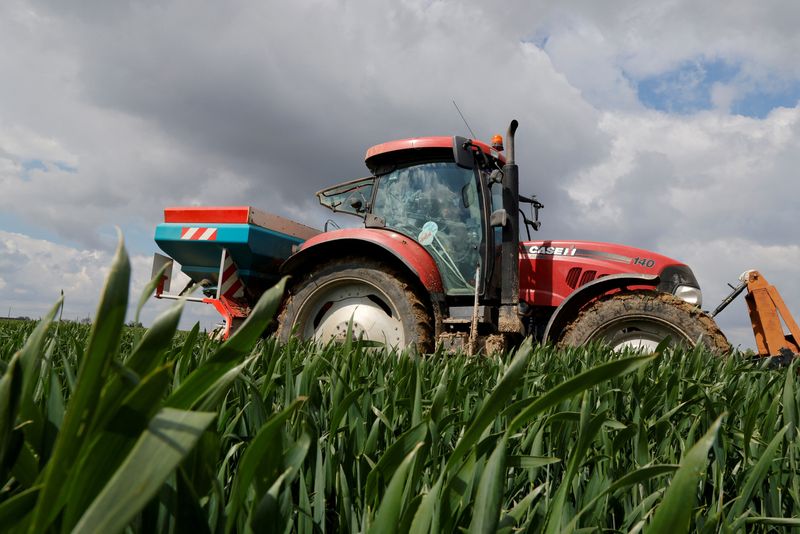By Rod Nickel, Mark Weinraub and Maytaal Angel
CHICAGO/LONDON (Reuters) - U.S. exports of nitrogen fertilizers jumped to a multi-year high this summer after surging natural gas prices in Europe drove up costs of producing the crop nutrient there, making U.S. shipments more competitive.
The brisk U.S. sales highlight the far-reaching effect of the war in Ukraine on global food and energy supplies. Russia, under financial sanctions, is a major producer of fertilizer and natural gas, key in making nitrogen products to boost yields of corn and other crops.
Since Russia's February invasion of Ukraine, Europe started weaning itself off Russian natural gas and a pipeline transporting ammonia from Russia to a Ukraine port shut down.
Tight fertilizer supplies have driven up crop nutrient prices so much worldwide that the United Nations warned this month of a "future crisis" of availability. European companies have been forced to close some fertilizer plants due to high costs.
Exports from the United States, the world's third-largest producer, soared to 370,000 short tons of nutrient in August, more than double the year-earlier total, according to the most recent U.S. Census Bureau data, compiled by industry group The Fertilizer Institute (TFI) for Reuters. That figure is the highest monthly total since TFI began tracking the data in 2013.
European buyers are outbidding domestic buyers in both the United States and other exporters like Indonesia and Malaysia, said Alistair Wallace, principal at Argus Media in London.
Despite the surge in exports, separate TFI data shows that as of June, U.S. nitrogen fertilizer supply was at its second-highest level in the last decade, indicating a global dislocation, rather than shortage.
It is not yet clear whether the U.S. produced more than usual in July and August, or diverted a larger share of supplies to Europe, said Jason Troendle, economist at TFI, whose members include CF Industries (NYSE:CF) and Nutrien (NYSE:NTR).
The United States is historically a small exporter, and its ability to backfill markets is limited, Troendle said.
The countries with the biggest year-over-year increases in U.S. purchases are in Europe - France, Belgium, Norway and Lithuania - as well as Morocco, Chile and Brazil, Troendle said.
European countries typically buy most of their imported urea, a form of nitrogen fertilizer, from North Africa, but are now purchasing it further afield, Wallace said.
EU nitrogen prices eased in mid-October as some European plants resumed production due to softening natural gas prices, he said.
European farmers are not able to stock up on fertilizer as much as they should ahead of planting next spring due to high prices and tight supply, said Pekka Pesonen, secretary-general of European farming group Copa-Cogeca.
"We're talking about the need for huge volumes over a short period of time," Pesonen said.
Despite high input costs, U.S. growers may sow even more fertilizer-intensive corn next year. A Farm Futures growers survey forecasts corn acreage at a 10-year high of 94.282 million acres, up 6.4% from 2022.
Farmer Dave Nelson of Belmond, Iowa, has seen his fertilizer costs soar to $1,280 per ton this year from $350 a ton two years ago. He locked in that price this fall so he could start calculating a 2023 budget.

“I might as well do it because (price) is only going to go higher,” said Nelson, who grows corn and soybeans. “If you start skimping on fertilizer... you just end up hurting yourself in the end.”
Brazil, which relies on imports for 85% of its fertilizer, bought more ammonium nitrate from the United States, Belgium and Holland in the January-September period to make up for reduced Russian supplies, investment bank Itau BBA said.